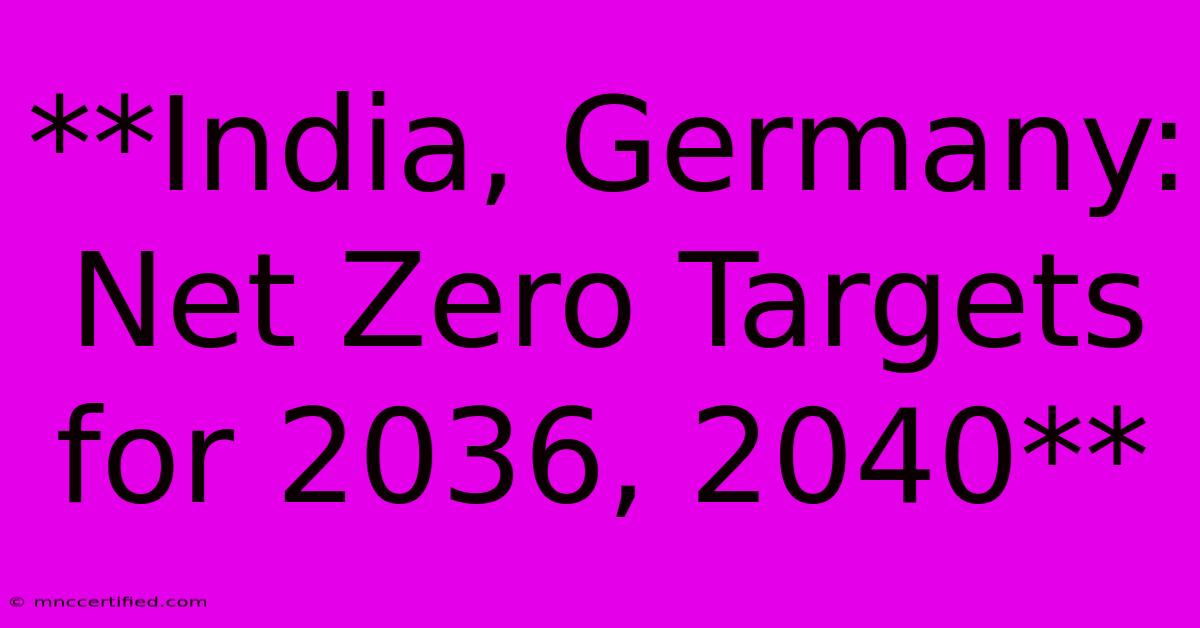**India, Germany: Net Zero Targets For 2036, 2040**

Table of Contents
India and Germany: Ambitious Net Zero Targets for 2036 and 2040
The global fight against climate change is gaining momentum, with more and more countries setting ambitious targets for achieving net-zero emissions. Two prominent examples are India and Germany, both demonstrating strong commitment to a sustainable future.
India's Net Zero Target: 2036
At the COP26 climate summit in 2021, India announced its net zero target for 2036. This ambitious goal marks a significant step forward in India's climate action plan. It emphasizes the country's commitment to a clean energy transition and its role in mitigating global warming.
India's net zero target is supported by several key initiatives:
- Renewables: Increasing the share of renewable energy sources in the energy mix. India aims to achieve 500 GW of non-fossil fuel-based installed electricity capacity by 2030.
- Energy Efficiency: Promoting energy efficiency measures across various sectors to reduce overall energy consumption. This includes initiatives in industries, buildings, and transportation.
- Carbon Capture and Storage: Investing in research and development of carbon capture and storage technologies to mitigate residual emissions.
- Green Hydrogen: Fostering the development of green hydrogen production and its applications. Green hydrogen, produced using renewable energy, has the potential to decarbonize various industries.
Germany's Net Zero Target: 2040
Germany, a leading European economy, has set a net zero target for 2040. This ambitious goal underscores Germany's commitment to a sustainable future, emphasizing its role in driving global climate action.
Germany's net zero target is supported by a range of policies and initiatives:
- Renewable Energy Expansion: Accelerating the transition to renewable energy sources by expanding wind and solar power capacity. Germany aims to achieve 100% renewable electricity generation by 2035.
- Phasing Out Coal: Gradually phasing out coal-fired power plants and replacing them with renewable energy sources.
- Electrification: Promoting the electrification of transport, heating, and other sectors. This involves transitioning to electric vehicles and promoting heat pumps.
- Carbon Pricing: Implementing a carbon pricing mechanism to incentivize emissions reduction and drive investment in clean technologies.
Challenges and Opportunities
Both India and Germany face significant challenges in achieving their ambitious net zero targets. These include:
- Financing: Securing adequate funding for the necessary investments in renewable energy, energy efficiency, and clean technologies.
- Infrastructure: Upgrading and expanding energy infrastructure to accommodate the increased deployment of renewable energy sources.
- Job Transition: Supporting workers in industries affected by the transition to a low-carbon economy.
- Technological Innovation: Driving innovation in clean technologies to reduce costs and improve efficiency.
Despite these challenges, there are also significant opportunities associated with achieving net zero targets. These include:
- Economic Growth: Creating new industries and jobs in the renewable energy sector and associated industries.
- Technological Leadership: Developing and deploying cutting-edge clean technologies, giving a competitive edge in the global market.
- Improved Public Health: Reducing air pollution and improving overall health outcomes.
- Global Leadership: Demonstrating strong leadership in the fight against climate change and encouraging other countries to follow suit.
Conclusion
India and Germany's ambitious net zero targets highlight their commitment to a sustainable future. These targets present both challenges and opportunities, but they are crucial steps towards addressing climate change and building a more resilient and equitable world. By collaborating and sharing knowledge, India and Germany can pave the way for a global transition to a low-carbon economy, ensuring a brighter future for generations to come.

Thank you for visiting our website wich cover about **India, Germany: Net Zero Targets For 2036, 2040** . We hope the information provided has been useful to you. Feel free to contact us if you have any questions or need further assistance. See you next time and dont miss to bookmark.
Featured Posts
-
Paddington 3 Filming Locations Peru
Nov 09, 2024
-
Mc Donald S 1 Chicken Mc Nuggets Until December
Nov 09, 2024
-
Warriors Lose To Rangers In Tight Match
Nov 09, 2024
-
Early Childhood Investment Corporation
Nov 09, 2024
-
Insurance Companies In Cartersville Ga
Nov 09, 2024